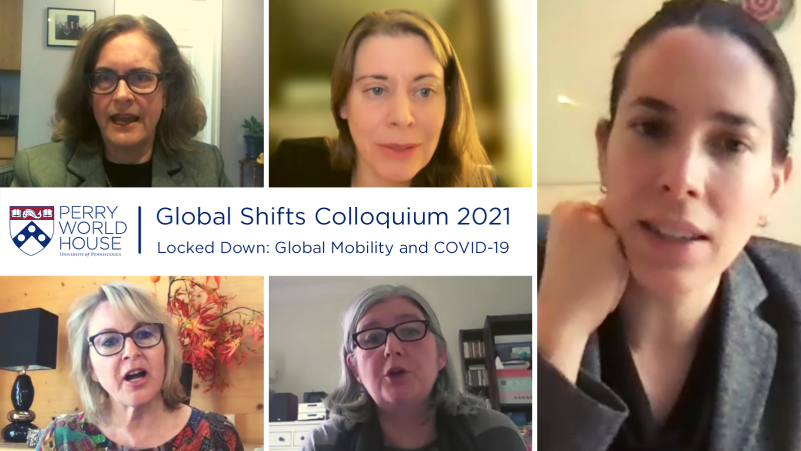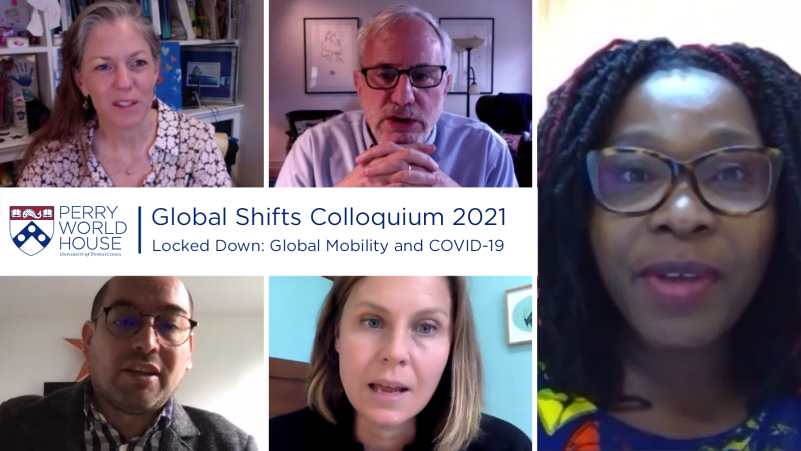Global Shifts Colloquium: March 23-26, 2021 Locked Down: Global Mobility and COVID-19
Basic Page Sidebar Menu Perry World House
The 2021 Global Shifts Colloquium, Locked Down: Global Mobility and COVID-19, brought together academics and policymakers from around the world to analyze how the COVID-19 pandemic has affected global mobility and how to mitigate its negative consequences.
Over the course of a two-day academic workshop, participants looked at the efficacy of policies implemented during the COVID-19 pandemic and how they might be improved in case of future pandemics. To close the colloquium, the United Nations High Commissioner for Refugees, Filippo Grandi, delivered a keynote address about COVID-19’s impacts on refugees and the UNHCR’s work in conversation with NPR’s Deborah Amos.

Opening the colloquium, a session on “Border Closing & Re-Opening: National & Regional Policies” framed the overarching topics for our expert discussions.
The panel featured experts from the fields of public health, epidemiology, political science, and public policy. Speakers agreed that although border closures can be somewhat effective in containing the spread of disease, they introduce multiple additional problems, must be combined with other measures to work, and potentially violate international law and human rights agreements. The panel also discussed the practical, legal, and moral implications of vaccine passports, and other mechanisms for effective policy design and enforcement to best protect people and public health.
The workshop’s subsequent three panels looked at how COVID-19 had affected specific types of movement or groups of people, including the travel and tourism industries, migrant workers, and refugees and asylum seekers.
The second panel, “Recovering Industries: Global Tourism and Transportation,” dove deep into the devastating impacts that COVID-19 has had on the travel and tourism industry as well as the road to recovery. This panel featured experts in the travel, tourism, and hospitality fields from around the world. They provided an overview of how deeply affected the travel and tourism industries have been by the pandemic and how they must be reshaped to accommodate travel restrictions and consumer fears about public health risk of traveling. One central theme the panelists all touched upon was using the pandemic as a catalyst for positive change within the industry. From minimizing the environmental impact of the industry to overhauling the skills of its workers, the panelists agreed that the pandemic must be used as an opportunity to build the travel and tourism industry back better.

The second day of expert discussions focused on the impact of COVID-19 mobility restrictions on migrant workers, refugees, and asylum seekers.
The workshop's third panel, “Moving for Work: Migrant Workers and International Labor”, focused on how migrant workers have been impacted by the changes to mobility caused by the pandemic. The panelists agreed that COVID-19 had put migrants in an incredibly vulnerable position. These vulnerabilities included being at high risk of contracting the virus without access to medical care or adequate space to quarantine, of losing their jobs, and of deportation or being stranded and unable to return home due to COVID-19 travel and immigration restrictions. Speakers also came to the consensus that COVID-19 had exposed many of the existing flaws and dangers in global migrant labor systems, and urged changes to allow for more flexibility within the labor market, pathways to citizenship, and protections of human rights.
The fourth and final panel of this year’s colloquium, “Searching for Safety: Refugees and Asylum Seekers,” discussed the increasing hardship and vulnerabilities that refugees have been subjected to throughout the pandemic. Many countries have used the COVID-19 pandemic as an opportunity to close their borders and limit or refuse asylum seekers and refugees in the name of public health. However, these limitations, at their core, were often rooted in political motivations rather than public health interests, as screening and quarantine measures could allow for containment of the virus while travel continued. Panelists also highlighted the increased exposure of refugees to COVID-19 risks, including spread of the virus in crowded living conditions and their exclusion from many country’s national economic recovery plans and vaccine distribution.
The multi-day colloquium culminated in a keynote presentation featuring the UN Refugee Agency’s High Commissioner Filippo Grandi and NPR International Correspondent Deborah Amos.
The High Commissioner outlined many issues touched upon by the previous session’s panelists, particularly that refugees and other displaced communities have become even more vulnerable during the pandemic. While COVID-19 presented new risks, existing conflicts continued and further exacerbated hardships already experienced; these were made worse by increasing closure of borders and reductions of humanitarian aid.
While the path forward may be difficult, High Commissioner Grandi portrayed optimism about the Biden administration’s efforts to restart the asylum program in the United States and provided five key lessons to move forward: emphasize prevention of push-factors that cause people to be displaced; be better prepared at detecting what global events may trigger displacement; aggressively combat stigma towards displaced peoples; include refugees in healthcare, economic systems, and educational systems; and pursue multilateralism as a crucial tool in coming together to support displaced people around the world.
The 2021 Global Shifts Colloquium was made possible by the generous support of Carnegie Corporation of New York.

